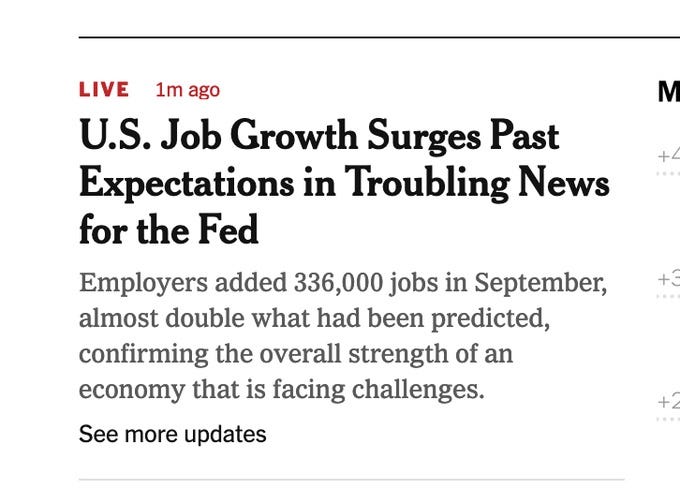The monthly jobs report from the Labor Department’s Bureau of Labor Statistics showed unexpectedly strong job growth, with 336,000 nonfarm jobs added to the economy in September. The unemployment rate remained stubbornly good at 3.8 percent, the same as last month, and pretty much all the other employment stats — broken down by race and sex and long-term unemployment and favorite baseball team — remained pretty much unchanged, although workers who root for the Seattle Mariners experienced a massive wave of familiar but unpleasant “Well shit, there they go again” feels in the final weekend of the month.
The job growth far outpaced the Dow Jones forecast of 170,000 new jobs, and was an increase of 100,000 jobs over August’s numbers, which I missed by going on vacation Labor Day weekend. September’s jobs report was the largest gain in employment since January of this year.
Stocks were up on the news, with the Dow up .9 percent, the S&P up 1 percent, and the Nasdaq Composite rising 1.2 percent while explaining yet again “I am heavily weighted toward, but not limited to, tech stocks.”
Also too, the monthly reports for July and August jobs growth were both revised upwards, by 79,000 for July and 40,000 for August, meaning the actual total for the two months came to 455,000, you are welcome.
Kids, this economy is doing pretty goddamn well, as Democratic Polls Guy Simon Rosenberg points out:
average hourly earnings up 0.2% in October and 4.2% over the past 12 months. With inflation now at 3.7% over the past 12 months, real earnings over the past year remain firmly in positive territory.
The Atlanta Fed’s GDPNow livecast is showing the Q3 GDP number coming in at 4.9%. We will get the real number later this month but this is very encouraging.
Gosh, even the usually grumpypants economists CNBC usually rounds up seem to have forgotten to be dismal:
“Slowdown? What slowdown? The U.S. labor market continues to exhibit amazing strength, with the number of new jobs created last month nearly twice as large as expected,” said George Mateyo, chief investment officer at Key Private Bank.
Lest anyone get too giddy, or even irrationally exuberant, that paragraph is immediately followed by a bucket of rhetorically chilly water, and then one more happier paragraph, creating the narrative rollercoaster mandatory in economic reportage:
Investors have been on edge lately that a resilient economy could force the Federal Reserve to keep interest rates high and perhaps even hike more as inflation remains elevated.
Wage increases, however, were softer than expected, with average hourly earnings up 0.2% for the month and 4.2% from a year ago, compared to respective estimates for 0.3% and 4.3%.
It all probably means the Fed is likely to ratchet up interest rates again, after taking a break for a bit, unless of course it doesn’t. Either way, the drama will be as incredible and unprecedented as it always is.
For a real live example of how dreadful economic reporting can be, let’s take this lovely threadnugget from Magdi Jacobs on Xitter, who reads the New York Times for filth, calling out this absurd headline and subhead from earlier this morning:
Oh no, a strong jobs report and strong economy! Elsewhere in the thread, Jacobs offers a screenshot of the Times front page that would be hilarious in a movie about a bunch of hacks deliberately slanting the news, leading with the “troubling news” and a group of other dire portents of strong jobs growth:
-
The jobs report may worry the Federal Reserve.
-
Interest rates are jumping on Wall Street. What will they do to housing and the economy?
-
The markets are jittery. Here’s why the strong jobs report may not help.
That last one has been updated to the far more defensible and neutral “Yields Jump and Stocks Swing After Strong Jobs Report,” and the original bullshit main headline, “U.S. Job Growth Surges Past Expectations in Troubling News for the Fed,” has similarly been revised to “U.S. Job Growth Surges Past Expectations in a Sign of Unexpected Vigor.”
As Jacobs comments on the whole sorry mess,
“For the record, I do understand that economic news is always complex, so I don’t need this complexity explained to me. It is in fact this complexity that makes it even more perplexing that a good Jobs Report must be reported as unilaterally bad news.”
But golly, where’s the drama in complexity and nuance?
That said, sometimes nuance may not be needed that much. Let’s go back to Rosenberg’s overview for the long view, and some numbers you may wanna make into iron-on patches for your Republican friends’ foreheads:
With this new data our monthly jobs tracker clocks in at:
33.8m jobs – 16 years of Clinton, Obama
13.9m jobs – 32 months of Biden
1.9m jobs – 16 years of Bush, Bush and Trump
Biden’s 13.9m jobs are more than 7 times as many jobs as were created in the 16 years of the last 3 Republican Presidencies, combined. Since 1989 and the end of the Cold War, the US has seen 50 million new jobs created. Remarkably 48 million of those 50 million jobs – 96% – were created under Democratic Presidents. Essentially all of them.
Hell, for the sake of nuance, even if you want to set aside the net loss of 10 million jobs in 2020 during the pandemic (20+ million jobs lost in a month, then the late-2020 beginnings of the recovery), Democrats still come way out on top. The pandemic job losses were finally restored by September 2022, and it’s been steady growth since then.
In conclusion, you’d be crazy to vote the GOP back into office, America, so please don’t be crazy, OK?
[BLS / CNBC / Hopium Chronicles / Magdi Jacobs on Xitter]
Yr Wonkette is funded entirely by reader donations. if you can, please subscribe, or if it’s more convenient to make a one-time donation, go right ahead and do so using this button that is guaranteed to prevent a recession, unless it isn’t.
























































![Key Metrics for Social Media Marketing [Infographic] Key Metrics for Social Media Marketing [Infographic]](https://www.socialmediatoday.com/imgproxy/nP1lliSbrTbUmhFV6RdAz9qJZFvsstq3IG6orLUMMls/g:ce/rs:fit:770:435/bG9jYWw6Ly8vZGl2ZWltYWdlL3NvY2lhbF9tZWRpYV9yb2lfaW5vZ3JhcGhpYzIucG5n.webp)






















